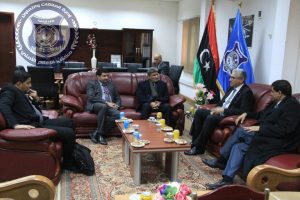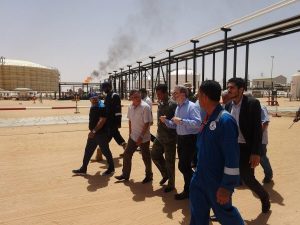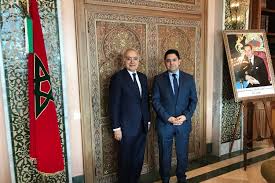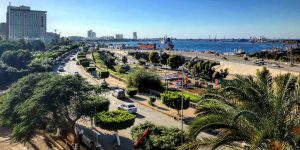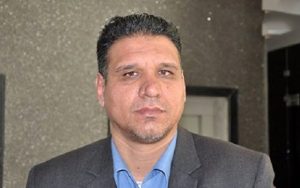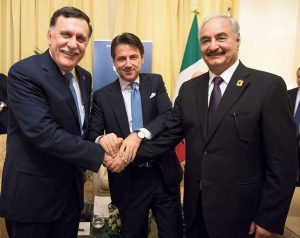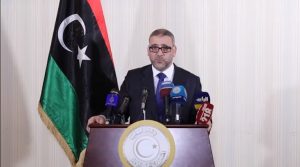A security source from Taragin town south of Libya confirmed the killing of four of Khalid Ibn al-Walid armed group of Dignity Operation, after clashing with ISIS militants in the agricultural districts.
The source pointed out that the fighters of the so-called 10th and Khalid Ibn al-Walid battalions have taken control of the entire area of the agricultural districts in the area of Ghadwa, after defeating ISIS militias.
In the same context, the Director of Medical Affairs at the Taragin Hospital, Saleh Mayouf confirmed that at least three people were killed and three others wounded in Tuesday’s clashes that took place in the agricultural districts south of the city.
Interior Minister discusses with Benghazi MPs unification of state security organs of all regions
Interior Minister Fathi Pashagha discussed with Benghazi members of House of Representatives Khalifa Al-Daghari and Nasr Al-Din Muhani supporting the efforts of security integration and coordination with the Ministry of Interior of the east-based Interim Government.
The two sides also reviewed at their meeting in the ministry’s HQ in Tripoli, the latest developments on the security file and the unification of security efforts between the ministries of interior in the two governments, in a way that achieves the unification of security departments throughout the Libyan territory.
Head of Libya’s state oil firm requests CBL to adopt a 67% wage raise for oil workers
National Oil Corporation (NOC) Chairman Mustafa Sanallah has reviewed the 2019 Libyan oil and gas sector budget with the governor of the Central Bank of Libya (CBL) Al-Siddiq Al-Kabeer.
Sanallah called during the meeting for the implementation of a 67% salary increase for all oil workers as per the 2019 budget, in fulfillment of resolution 642, adopted on October 27, 2013, issued after efforts of the NOC Board of Directors at that time, according to the statement posted on NOC’s website.
“The resolution was not implemented as a result of a block on all salary increases, including this decision, under Article 29 of Law No. 13 of 2014, on the adoption of the General Budget for the year 2014, issued by the General National Congress.” The statement remarks.
Sanallah stressed that oil sector workers are national role models and deserve sincere appreciation for their efforts and sacrifices in increasing production, thereby rebuilding Libya’s economy.
He also emphasized that improvement of oil sector workers’ living conditions is a top priority of the NOC’s Board, and that he expects tangible results within the framework of the 2019 budget.
“The exchange rate was also discussed and its impact on the oil sector production, refining, manufacturing and services.” He added.
The two parties, according to a statement, discussed the importance of increasing NOC’s budget given the investment needed to repair facilities damaged due to recent conflicts.
“Investment in the oil sector will generate additional income for the public treasury, positively affecting the country’s economy – especially given NOC’s recent success in increasing production levels to 1.25 million barrels per day; in spite of challenging circumstances.” The statement reads.
On the other hand, CBL’s governor renewed support for NOC as “the only source of income for the country, and the main source of funding for the treasury,” pointing out that the CBL will continue to provide all forms of support to NOC to overcome current difficulties, and to improve its technical capacities and enhance production capacity.
UN envoy to Libya and Moroccan Foreign Minister discuss restoring stability to Libya
The Head of the UNSMIL, Ghassan Salamé, has held talks in Morocco with its Foreign Minister Nasser Bourita, to review the Libyan political crisis.
At a joint press briefing following the meeting that took place in Rabat on Monday, Bourita renewed Morocco’s support to an inter-Libyan solution under the auspices of the UN to achieve a final settlement of the crisis.
Bourita, according to Moroccan media reports, underscored that “Morocco supports a solution formulated by the Libyans themselves” emphasizing the role of the UN as “the unique body empowered to solve the Libyan crisis.”
“Given the Maghreb scope of the Libyan crisis, Morocco attaches particular interest to the settlement of the Libya crisis, in the framework of the Skhirat agreement and the various proposals put on the table to bring this sister country out of the impasse,” Bourita remarked.
The UN envoy said his visit to Rabat actually falls in the context of consultations on how to take advantage of the next steps to help restore stability in Libya.
Salamé also vowed to continue consultations with Morocco on all the aspects of the Libyan crisis.
Salamé also described the coming steps as “important,” mentioning the international conference scheduled to be held in Palermo, Italy, on November 12-13 and the briefing he will shortly make to the UN Security Council on the political situation in Libya.
US Relaunches US-Libya Space Camp Scholarship

December 24, 2018 in Education & Training
The U.S. Embassy to Libya is now accepting applications for the 2019 U.S.-Libya Space Camp Scholarship Program that will give Libyan students and educators the opportunity to challenge themselves in an elite training center designed for the top scientists and astronauts from around the world.
The U.S. Embassy, in partnership with the Ministry of Education and the Libyan organization Hexa, will select one up to 12 students (ages 15 – 18) and one educator focused on science, technology, engineering and math (STEM) subjects to represent Libya at the U.S Space Camp facility in Huntsville, Alabama for one week in August 2019.
Selected participants will take part in a comprehensive program designed to promote interest in space science and exploration as well as global cooperation. Selected students will be challenged both academically and physically through extended-duration missions and experiencing microgravity in the Underwater Astronaut Trainer.
The 2019 Space Camp Scholarship program falls under the recently renewed U.S.-Libya Science and Technology Cooperation Agreement and commemorate the 10th anniversary of the first U.S. Embassy sponsored Space Camp Scholarship Program for Libyans that was initially launched in 2009.
HOW TO APPLY:
In order to apply to the program, students and educators need to complete separate online application forms.
All Space Camp activities are conducted in English, therefore English fluency is required for both students and educators. Only Libyan citizens currently residing in Libya will be considered for this program.
Application Overview for Students
Applicants should be students who have a strong interest in and academic aptitude for STEM. A record of relevant academic achievements or professional excellence will be considered, along with leadership skills and the ability to collaborate well in group settings.
Applicants must exhibit serious commitment in sharing the skills learned when coming back to Libya, and demonstrate flexibility, open-mindedness, good social skills and maturity.
Applicants must also understand that, if selected, they will be expected to fully and seriously participate in all program components during the week, as well as in follow-up activities afterward in Libya.
All Space Camp activities are conducted in English, therefore English fluency is required. Only Libyan citizens currently residing in Libya will be considered for this program.
Eligibility Requirements for Educators:
Must be 15-17 years of age as of February, 2019.
Highly proficient in English;
Must currently attend a High school in Libya and be committed to remaining enrolled in high school in Libya after returning;
Demonstrate strong leadership potential and interest in STEM
Sustained high level of academic achievement or professional excellence, as indicated by academic and other awards;
Demonstrate a commitment to community and extracurricular activities;
Have had little or no prior U.S. study or travel experience in the United States;
Be mature, responsible, independent, confident, open-minded, tolerant, thoughtful and inquisitive;
Willing and able to fully participate in an intensive summer program;
Comfortable with campus life, shared living accommodations, travel and interaction with a multinational group of participants from all over the world. Able to adjust to cultural and social practices different from those of their home countries.
The deadline is February 15. Apply here: www.spacecamplibya.ly
Application Overview for Educators
Applicants should be an experienced STEM teachers who posse leadership skills and the ability to collaborate well in group settings. Applicants must exhibit serious commitment in sharing the skills learned when coming back to Libya. The ideal candidate must also demonstrate flexibility, open-mindedness, and good social skills. Applicants must also understand that, if selected, they will be expected to fully and seriously participate in all program components during the week, as well as in follow-up activities afterward in Libya.
Eligibility Requirements for Educators
A full-time teacher in STEM.
Highly proficient in English;
Commitment to continuing to teach STEM;
Demonstrate strong leadership potential and interest in STEM
Sustained high level of academic achievement or professional excellence, as indicated by academic and other awards;
Demonstrate a commitment to community and extracurricular activities;
Have had little or no prior U.S. study or travel experience in the United States;
Be confident, open-minded, tolerant, thoughtful and inquisitive;
Willing and able to fully participate in an intensive summer program;
Comfortable with campus life, shared living accommodations, travel and interaction with a multinational group of participants from all over the world. Able to adjust to cultural and social practices different from those of their home countries.
Oil Revenue could rise 76% YoY
The National Oil Corporation (NOC) has declared that November income from sales of crude oil, derived products, and taxes and royalties received from concession contracts was approximately 2.4 billion USD – the third highest monthly total of 2018.
However, the figure is down from the 2.87 billion USD sold in October.
Total projected revenue for the year is estimated at 24.2 billion USD – a 76% year-on-year increase.
NOC chairman Mustafa Sanalla commented:
“The corporation’s achievements are for the benefit of all Libyans. NOC will continue to drive the economic recovery and provide the funds necessary to ensure a fair distribution of wealth and economic justice across the country.
“We are also working hard to implement agreed security measures at Sharara so operations and production can resume as soon as possible. Pending the implementation of key reforms by the government to the local Petroleum Facilities Guard, we will re-open the field. NOC must be enabled to continue its role unhindered.”
Libya: UK leads the way as Libya re-opens for business
“The meetings in Aberdeen, in May, and this week in Tunis, have shown that the UK is a key partner for Libya in boosting oil production,” Mustafa Sanalla, Chairman of the National Oil Corporation (NOC), said at the recent trade mission hosted in Tunis by the Libyan British Business Council (LBBC).
I could not have put it better. The LBBC event – themed, “Building Bridges Together” – brought together over 60 representatives of the UK oil and gas industry to meet more than 120 of their Libyan business counterparts. I am delighted to hear some of the leading British oil companies are gradually resuming their work in Libya to support the NOC’s goal of increasing oil production to 2 million barrels a day by 2020. There is clear Libyan appetite for UK goods and services, including the UK offer on education (especially English Language Teaching) and healthcare. In 2017, trade between the UK and Libya more than doubled (up 138%).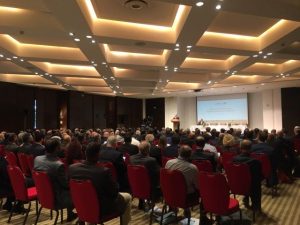
We are offering support because we believe in Libya’s substantial potential, to become a hub for business and trade, and the determination of the Libyan people to achieve this goal. A strong Libyan economy will play an important role in the country’s stability and long-term security, and British businesses have an important role in realising this.
The UK is at the forefront of diplomatic efforts, working closely with Libyans, the UN Special Envoy Ghassan Salamé and the international community to deliver an inclusive and durable political solution, and an improved security situation across the country. We are also working with these partners and International Financial Institutions to facilitate greater economic reforms and transparency. On top of this engagement, the UK’s Conflict, Stability and Security Fund (CSSF) is providing £12 million this financial year to, amongst other things, rebuild critical infrastructure, remove the unexploded remnants of war and build capacity within government to deliver public services more effectively.
Furthermore, £1.5 million of our CSSF funding is being spent on microfinancing projects with a focus on youth and female entrepreneurs. I am personally committed to the UK Government’s work on gender equality – and am pleased to be writing this article during our Embassy ‘Gender November’ month which is showcasing our work on gender equality all year-round. Empowering women and girls is not only an integral part of our British values – it also improves peace and stability, economic growth and poverty reduction.
There is no doubt that the challenges are big, but Libya’s potential is far bigger. The wide range of UK support is helping to create a more permissible environment for trade and investment, and to uncover opportunities for British expertise to help Libya’s reconstruction.
Solution in Libya should be outside HoR and HCS, official says
The member of the High Council of State (HCS) Abulqasim Gazit said a real solution to Libya’s crisis needs working without the involvement of the HCS and the House of Representatives (HoR.)
On Friday, Gazit told reporters that the HoR and HCS are becoming detached from the reality of Libyans day in and day out, clinging to their own visions and refusing to give concessions.
“The current cooperation between HoR and HCS is just a maneuver for them to keep their positions, fearing that the final say will be given to the Libyans via voting because they know that the Libyan people will kick them out right off the bat.” He explained.
He also said that the HCS’s statement regarding the HoR’s constitutional amendment is unwise and doesn’t represent the HCS as it had not been issued in an official session.
“If the HCS leadership continues to act individually, many members will defect once a chance appears in the horizon.” Gazit said.
The HCS expressed bewilderment on Thursday for the High National Election Commission (HNEC) approval of the constitution referendum law while it is still under deliberation.
“Such procedure will expose the consequent actions to constitutional appeals,” HCS said in the statement.
The HCS said the HoR had violated (Article No.12) of the appendix provisions of the political agreement when adopted the referendum law.
The Chairman of the Libyan High National Elections Commission (HNEC) Emad Al-Sayeh said in a press conference last Thursday that he expects the referendum for the Libyan constitution to be held late next February.
News In Brief Italy to host a meeting between Sarraj and Haftar
Italian Prime Minister Giuseppe Conte has disclosed a meeting between the Presidential Council’s (PC) head Fayez Al-Sarraj and commander of the so-called Dignity Operation Khalifa Haftar in Rome.
Conte clarified that the meeting is to be held next week in Rome, adding that the step is part of Italy’s efforts to reach a solution to the Libyan crisis.
Conte’s comments came after news circulated by foreign media outlets that Sarraj has made an invitation to Haftar to visit Tripoli amid heightened security reinforcements.
HCS head: referendum law on the constitution is contrary to the political agreement
President of the High Council of State (HCS), Khalid al-Mishri, said that the amendments to the Constitutional declaration made by the House of Representatives (HoR) are contrary to the political agreement, noting that this agreement is the only way to a common political formula.
This came during a press conference following the 36th session of the HCS, which was held at its HQ in Tripoli on Monday, to discuss the restructuring of the executive branch, in addition to the constitutional amendment X and XI issued by the HoR .
Al-Mishri pointed out that the amendment of the political agreement’s articles will cancel the original version, stressing the objection of the HCS on dividing Libya into three constituencies.
The HoR has approved in a meeting held on November 26, the constitutional amendment, which includes the fortification of Article VI of the referendum law, which requires the division of the country into three constituencies.
It was also stipulated that the draft constitution would have to reach 50 + 1 in each region, which is two-thirds of the people nationwide.
“The HCS have tried to reach out to the HoR, in order to reach a sound mechanism to ensure the referendum on the Constitution and the amendment of the executive branch to become composed of a president and two deputies, Al-Mishri said.
He also expressed his disapproval of issuing these amendments without referring to the HCS to agree on the form of the state, regarding whether to divide it into several electoral districts or to adopt a single electoral constituency, considering dividing the country into three constituencies to be contrary to the constitutional declaration.
The HCS’s head pointed out that the new amendment did not clarify in the case the constitution was refused by the Libyan people that it will be referred to the Constitution Drafting Assembly, unlike the first amendment.
He also pointed out that the referendum law provided that the vote was not to be with a yes or no, but rather with yes or (no with stating the reason of refusal), noting that this had never occurred in any previous referendum.
Al-Mishri stressed their demand to form a mini-presidential council consisting of a president and two deputies and an independent prime minister, emphasizing the HCS’s desire to go to parliamentary and presidential elections as soon as possible.
المركز المغاربي للأبحاث حول ليبيا
تعريف:
تأسس المركز المغاربي للأبحاث حول ليبيا في جوان - يونيو 2015 في تونس، وهو أول مركز من نوعه يعمل بكل استقلالية من أجل تعميق المعرفة بليبيا في جميع المجالات والقطاعات، ويرفد بالمادة العلمية جهود المجتمع المدني في ليبيا لإقامة الحكم الرشيد، المبني على التعددية والتداول السلمي واحترام حقوق الإنسان . مؤسس المركز: الإعلامي والباحث التونسي رشيد خشانة يقوم المركز بنشر مقالات وأوراق بحثية بالعربية والأنكليزية والفرنسية، ويُقيم مؤتمرات وندوات علمية، وباكورة نشاطاته ندوة حول "إسهام المجتمع المدني في إعادة الاستقرار والانتقال الديمقراطي بليبيا" يومي 5 و6 أكتوبر 2015 بتونس العاصمة.
موقع "ليبيا الجديدة"
موقع إخباري وتحليلي يبث الأخبار السريعة والتقارير السياسية والاقتصادية والثقافية والاجتماعية عن ليبيا، ديدنُه حق المواطن في الإعلام، ورائدُه التحري والدقة، وضالتُه الحقيقة، وأفقهُ المغرب العربي الكبير. يتبنى الموقع أهداف ثورة 17 فبراير ومبادئها السامية ويسعى للمساهمة في بناء ليبيا الجديدة القائمة على الديمقراطية واحترام حقوق الانسان والحكم الرشيد.


